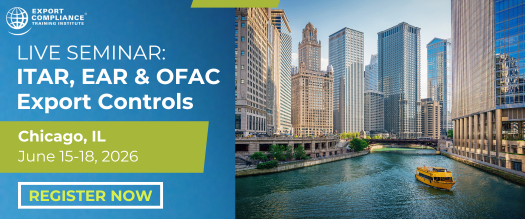When youngsters begin to think of what they want to be when they grow up, they think of careers as police officers, firefighters, doctors or professional athletes. Does anyone think of a career as an empowered official? I seriously doubt it (unless, of course, their last name is Lowell or Biancaniello). After all, to the best of my knowledge, no college or university offers a major with an “empowered official” curriculum. One can’t become a Doctor of Empowered Official Studies. If Bill Clinton were to specialize on the empowered official lecture circuit, he certainly would not be able to pay his legal bills. Even if a person puts “E.O.” after their name on their business card, it is unlikely to bring them any prestige in professional circles. So if people don’t dream of becoming an empowered official and there is no formal path of education leading to this “profession,” how do people become empowered officials?
In most cases, a person or persons leave a company (or are laid off), and management discovers someone has to sign export license applications the company still needs to submit to the State Department. The manager of the department with the licensing responsibility usually uses a thoughtful and scientific method for assigning empowered responsibility. He/she points a finger to Jane, Howard, or Sally and says, “You’ll sign the licenses now.” Behold, the birth of an empowered official!
Many people come to act as an empowered official (EO) in this way. Others act as an EO because they assume a position that has had the responsibility. Note that I use the term “act.” One has to ask, “Are these individuals really empowered officials?”
Section 120.25 of the ITAR defines “empowered official.” It states an EO is a U.S. person (note U.S. person) who is:
(1) directly employed by the applicant or a subsidiary in a position having authority for policy or management within the applicant organization; and
(2) legally empowered in writing by the applicant to sign license applications or other requests for approval on behalf of the applicant; and
(3) understands the provisions and requirements of the various export control statutes and regulations, and the criminal liability, civil liability and administrative penalties for violating the Arms Export Control Act and the International Traffic in Arms Regulations; and
(4) has the independent authority to (i) inquire into any aspect of a proposed export or temporary import by the applicant, and (ii) to verify the legality of the transaction and the accuracy of the information to be submitted; and (iii) to refuse to sign any license application or other request for approval without prejudice or other adverse recourse.
Let’s analyze this definition to see how many people “acting” as an EO really “are” an EO.
First, an EO must be a U.S. person. This means the person must be a U.S. citizen or permanent resident. (A protected individual also qualifies but let’s not go crazy on details). This usually isn’t a problem since most companies dealing with the ITAR are cognizant of the U.S vs. foreign person issue.
Second, an EO must be employed in a position having authority for policy or management within the organization. This would make low level administrative positions ineligible to be an EO, however it leaves open to interpretation what level in the organization is the appropriate level.
Third, an EO must be legally empowered in writing. I believe this is a very important requirement yet this is where most organizations fall short. Beside the fact it is a legal requirement, it is important for companies to formally acknowledge in writing the significant responsibilities they are assigning to a designated EO. Although it isn’t specifically required by the ITAR, I recommend that designated EO’s also acknowledge, in writing, that they accept these responsibilities.
Finally, the EO is to have independent authority to inquire into proposed export transactions and to refuse to sign requests for approvals without prejudice. Although it is not stated in the ITAR, I believe this authority should be extended to include the authority to stop questionable exports, also without prejudice.
So why is this important? When a person signs a license application, a certification letter, or other request for approval as an empowered official, it includes a certification that he/she is empowered by the applicant. If a person signs the application without meeting any part of the “empowered official” definition, he/she could be charged with making a false statement. In addition, the EO is certifying that neither the company, none of the company’s senior officials, nor members of the board of directors has been indicted or convicted of violating any of the criminal statutes enumerated in section 120.27 of the ITAR. How many people know what these statutes are and if any company officials have been indicted or convicted under any of them? As we have been seeing more instances of corporate malfeasance recently, this has become an increasingly important question.
The statutes listed in section 120.27 and a brief summary of each follow below:
– Section 38 of the Arms Export Control Act (22 U.S.C. 2778) Although the ITAR states section 38, it should really be section 39. Subchapter 2778 provides the President with authority to control imports and exports of arms. Thus, any violation of the ITAR would be a violation of this statute.
– Section 11 of the Export Administration Act of 1979 (50 U.S.C. App.2410 This section of the EAA provides for criminal and administrative penalties under the EAA. Thus, a violation of the EAR would violate this statute.
– Sections 793, 794, or 798 of Title 18 U.S.C. (Crimes and Criminal Procedure) These sections relate to espionage and gathering, transmitting or disclosing defense information.
– Section 16 of the Trading with the Enemy Act (50 U.S.C. App.16) This section provides for criminal and civil penalties for violations of the TWEA.
– Section 206 of the International Emergency Economic Powers Act (50 U.S.C. App16) The civil and criminal penalties for violations of foreign asset controls.
– Section 30A of the Securities Exchange Act of 1934 (15 U.S.C. 78dd-1) Relates to prohibited foreign trade practices by issuers of securities. Along with 15 U.S.C. 78dd-2 (section 104 of the Foreign Corrupt Practices Act), it prohibits any offer or payment of anything of value to a foreign official for influence.
– 18 U.S.C. Chapter 105 Sabotage — destruction of national defense materials, national defense premises or national defense utilities.
– Section 4(b) of the Internal Security Act of 1950 (50 U.S.C. 783(b) Prohibits any unauthorized communication or transfer of any classified information to any agent or representative of a foreign government.
– 42 U.S.C. 2077, 2122, 2131, 2134, 2272, 2274, 2275, and 2276 Unauthorized dealings in special nuclear material and other actions in violation of the statute for the development and control of Atomic Energy.
– Section 601 of the National Security Act of 1950 (50 U.S.C. 421) Disclosure of information identifying a covert agent of the United States.
– Section 603(b) or (c) of the Comprehensive Anti-Apartheid Act of 1986 [22 U.S.C. 5113(b) and (c)] This act was repealed effective June 8, 1994. Perhaps some day the ITAR will be brought up-to-date
– Section 371 of Title 18 United States Code (18 U.S.C. Section 371) Actions by two or more persons to conspire to violate any of the statutes listed above.
So what is the point of all of this. First, if you are “acting” as an empowered official, make sure you meet all of the requirements to qualify. If you haven’t been empowered in writing, insist upon it. If you don’t believe you are qualified to be an EO, raise the issue with your management. Second, take the responsibilities seriously and don’t just sign DSP applications or transmittal letters routinely. Third, be aware of the criminal statutes and develop a procedure with your legal department to ensure you are informed in the unfortunate event that the company, its senior officials, or board members may be indicted or convicted of violating one of these statutes.
It’s probably too late for you to become a doctor or professional athlete, but do you now want to consider becoming a police officer or firefighter?
By Chuck Hough


